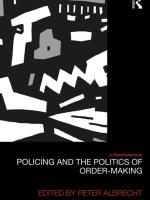Policing on the Urban Margins
Policing and the Politics of Order-Making, edited by Peter Albrecht (DIIS) and Helene Maria Kyed (DIIS), explores the political nature of making order through policing activities in densely populated spaces across Africa, Asia and Latin America. The chapters are based on in-depth ethnographic research, and draw on different academic traditions, including political science, sociology, criminology and anthropology. They analyze the politics of order-making based on studies of civilian policing groups, youth movements, politicians and other actors engaged in policing and politics in Haiti, Indonesia, Swaziland, Ghana, South Africa, Mexico, Bolivia, Haiti and Sierra Leone.
What these contexts have in common is a plurality of order-making practices. The state police have no monopoly on the means of violence and share their sovereign position with numerous other civilian policing actors. A number of interests are played out simultaneously, entailing re-negotiations over the very definition of what ‘order’ is. How and by whom a particular order is enforced is contested, at times violently so, and is therefore inherently political. In the existing literature on policing, legal pluralism and weak states in the Global South it is seldom made explicit that making order is a route to power and positions of political decision-making. It is this gap in the literature that this anthology fills, as it analyzes the politics at stake in processes of order-making. The theoretical and conceptual implications of this approach to policing in the urban margins are discussed in the Introduction to the volume, authored by Helene Maria Kyed and Peter Albrecht.
Peter Albrecht’s Chapter on Sierra Leone, co-authored with Nathaniel King, explores a particular variety of urban secret societies, the Odelays, and their central role in making order in Freetown. Their security functions encompass apprehending criminals and investigating and solving crimes in collaboration with the Sierra Leone Police (SLP), at times through their expansive social networks. Situated on the socio-economic and geographical margins of the city, the Odelays also give members a position of authority from which to engage with centres of power. Through their gatekeeper function, Odelays are able to negotiate relations with state representatives and expose the limits of the state’s reach.
Helene Maria Kyed’s Chapter on Swaziland explores how young unemployed men involve themselves in local crime fighting. Their position as new policing actors both gets contested by powerful local leaders, used in the political campaigns of national politicians, and also is a route to political positions for the policing actors themselves. The chapter shows the intimate links between policing and politics in a crime-ridden urban context where state police authority is contested and where the state fails to combat crime.
This has been said about the book:
‘Policing and the Politics of Order-Making is a smart and engaging examination of urban insecurity and policing, across a broad range of geographical locations. Scholars from a variety of disciplines will be interested in these essays’ exploration of order – what it means, how it is made, by whom, and the ways I which it is contested by a range of social actors. A much-needed contribution to our understanding order-making in contemporary cities around the world.’ Daniel M. Goldstein, Professor of Anthropology, Rutgers University
‘This volume interrogates the policing of the world’s megacities. Combining innovative theory and empirically rich case studies, it explains how urban protection across the Americas, Africa and Asia comprises plural, overlapping policing actors of both state and citizens. The collection investigates the ways that people on the urban margins improvise their own protection amidst high crime rates, and how community policing emerges not simply as a reflex of neoliberal reforms but with its own history and politics. The case studies shed new light on youth-led civilian policing groups, how they operate in the ‘twilight’ between official sanction and covert racket, and how they are shaped by and produce their political trajectories. This volume further complicates our understanding of global policing in a neoliberal age and is highly recommended’. David Pratten, Oxford University
‘This is a timely and very welcome contribution to the ongoing exploration of the politics and practices of plural policing in the urban margins. The well written chapters convincingly show how hard-to-categorize policing actors in cities such as Manila, Cape Town, Accra, Port-o-Prince and Mexico City, engage in everyday order-making as well as overt politics, ambiguously maneuvering the fine lines between legitimate and illegitimate use of violence’. Finn Stepputat, Danish Institute for International Studies.
DIIS Experts



